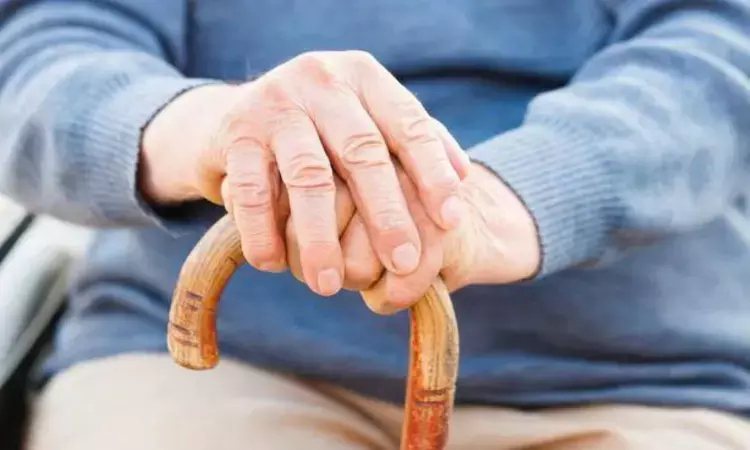- Home
- Medical news & Guidelines
- Anesthesiology
- Cardiology and CTVS
- Critical Care
- Dentistry
- Dermatology
- Diabetes and Endocrinology
- ENT
- Gastroenterology
- Medicine
- Nephrology
- Neurology
- Obstretics-Gynaecology
- Oncology
- Ophthalmology
- Orthopaedics
- Pediatrics-Neonatology
- Psychiatry
- Pulmonology
- Radiology
- Surgery
- Urology
- Laboratory Medicine
- Diet
- Nursing
- Paramedical
- Physiotherapy
- Health news
- Fact Check
- Bone Health Fact Check
- Brain Health Fact Check
- Cancer Related Fact Check
- Child Care Fact Check
- Dental and oral health fact check
- Diabetes and metabolic health fact check
- Diet and Nutrition Fact Check
- Eye and ENT Care Fact Check
- Fitness fact check
- Gut health fact check
- Heart health fact check
- Kidney health fact check
- Medical education fact check
- Men's health fact check
- Respiratory fact check
- Skin and hair care fact check
- Vaccine and Immunization fact check
- Women's health fact check
- AYUSH
- State News
- Andaman and Nicobar Islands
- Andhra Pradesh
- Arunachal Pradesh
- Assam
- Bihar
- Chandigarh
- Chattisgarh
- Dadra and Nagar Haveli
- Daman and Diu
- Delhi
- Goa
- Gujarat
- Haryana
- Himachal Pradesh
- Jammu & Kashmir
- Jharkhand
- Karnataka
- Kerala
- Ladakh
- Lakshadweep
- Madhya Pradesh
- Maharashtra
- Manipur
- Meghalaya
- Mizoram
- Nagaland
- Odisha
- Puducherry
- Punjab
- Rajasthan
- Sikkim
- Tamil Nadu
- Telangana
- Tripura
- Uttar Pradesh
- Uttrakhand
- West Bengal
- Medical Education
- Industry
Frailty Linked to Lower Bone Mineral Density in US Veterans with Rheumatoid Arthritis, Study Finds

USA: Results from a recent study presented at the American College of Rheumatology (ACR) Convergence 2024 in Washington, DC, show that frailty is linked to lower bone mineral density (BMD) in the total hip among a predominantly male cohort of veterans with rheumatoid arthritis (RA).
"We observed a significant association between frailty and total hip bone mineral density (THBMD) in a predominantly male cohort of US veterans with rheumatoid arthritis. Low BMD was common across the cohort. Measuring frailty could help identify individuals with RA at risk for low BMD and support osteoporosis screening in this high-risk group," the researchers reported.
Frailty, characterized by increased vulnerability to poor outcomes following physiological stressors, occurs at higher rates and younger ages in individuals with rheumatoid arthritis, particularly among women. While the relationship between frailty and low BMD and fractures has been well documented in predominantly female RA cohorts, there is limited data on this association in men. To fill this knowledge gap, Katherine Wysham from VA PUGET SOUND/UNIVERSITY OF WASHINGTON in Seattle, WA, and colleagues examined the relationship between frailty and bone mineral density in a predominantly male cohort of veterans with RA.
For this purpose, the researchers used data from the Veterans Affairs Rheumatoid Arthritis Frailty and Osteoporosis cohort, which included participants meeting the 2010 ACR RA criteria, aged ≥35. Frailty was assessed using the Fried Phenotype, categorizing individuals as robust, prefrail, or frail. BMD and body composition were measured with dual-energy x-ray absorptiometry. Low BMD was defined by T-score < -1.0 (total hip/femoral neck) for those >50, or Z-score < -2.0 for those ≤50. Univariable and multivariable regressions evaluated the association between frailty and total hip BMD, controlling for relevant factors, excluding osteoporosis medication use due to confounding.
The study revealed the following findings:
- 118 veterans were included in the study, with 73% being male and a mean age of 61.4±11.5 years.
- The cohort consisted of 70% White, 11% Black, 12% mixed-race, and 7% Hispanic/Latino participants.
- 8% were frail, 62% were prefrail, and 30% were robust.
- The frail group had the highest age, positive ACPA, HAQ score, pain, and CDAI.
- The frail group had the lowest prednisone dose, bDMARD use, %fat, and ALMI.
- The most common frailty components were exhaustion (48%), low hand grip strength (40%), and low physical activity (18%).
- Low BMD was present in 90% of the frail group, 48% of the prefrail group, and 46% of the robust group.
- Multivariable regression showed a significant negative association between frailty and total hip BMD (β=-0.147) compared to the robust group.
The researchers concluded that frailty assessment could help identify individuals with RA at risk for low BMD and inform osteoporosis screening in this high-risk population. They emphasized the need for future studies to determine if frailty can predict BMD loss, which would support its clinical application.
Reference:
Wysham K, Brubeck H, Riggles K, Bass R, Wahl E, Narla R, Singh N, orkaby a, Baker J, Katz P, Shoback D, Garcia J. Frailty Is Associated with Lower Bone Mineral Density in US Veterans with Rheumatoid Arthritis [abstract]. Arthritis Rheumatol. 2024; 76 (suppl 9). https://acrabstracts.org/abstract/frailty-is-associated-with-lower-bone-mineral-density-in-us-veterans-with-rheumatoid-arthritis/. Accessed December 19, 2024.
Dr Kamal Kant Kohli-MBBS, DTCD- a chest specialist with more than 30 years of practice and a flair for writing clinical articles, Dr Kamal Kant Kohli joined Medical Dialogues as a Chief Editor of Medical News. Besides writing articles, as an editor, he proofreads and verifies all the medical content published on Medical Dialogues including those coming from journals, studies,medical conferences,guidelines etc. Email: drkohli@medicaldialogues.in. Contact no. 011-43720751


